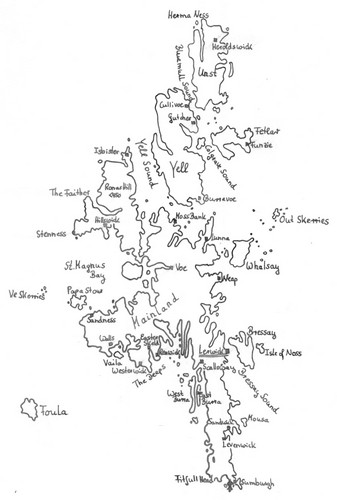Shelties "von der Hutzelschweiz"
Photos and details of individual "von der Hutzelschweiz" dogs can be seen in the database "Sheltie Pedigrees (verif.)".
Josef Eberhard jun., Germany
For the 1st German Sheltie-Handbook 1992 (editor Ursula Langer) I wrote the article "The German Sheltie History (Kennel Foundations and Imports until the End of the 60s)". There I also devoted a more than one-page paragraph to Mr. Eberhard:
"He had the great fortune to receive several above-average quality English Shelties (they also belonged to the elite in GB) from excellent lines, which made his "von der Hutzelschweiz" Shelties famous even beyond the borders and helped the Sheltie breed in Germany to blossom again. His first import (end of 1957), the b/w Stiletto From Shiel became the first Sheltie in German ownership to carry the prestigious FCI International Champion title. Stiletto was also the dam of Sheer Sauce From Shiel, who became GB Championess at the age of 11 months and who followed her dam to Germany a short time later - certainly a loss for GB, but what a gain for the German Sheltie breed! With "flying flags" this bitch received everything that could be won at shows at that time. Also arriving in Heppenheim were Ch. Riverhill Robin Goodfellow (taken over from a Belgian breeder), Sealodge Strike Lucky (later sold to a Dutch breeder and gained his NL Ch. title), Ch. Scaurie Of Shelert, Fanfare Of Tooneytown as well as the valuable breeding bitches Riverhill Rich Gift and Silva Samba From Shiel.
In the old club bulletins of the CfBrH one can read that some of the imports mentioned had great acclimatisation difficulties and initially partly failed in breeding. For example, Mr. Eberhard's first Sheltie litter was not until the end of 1958 after Sealodge Strike Lucky x Riverhill Rich Gift; in the following years, however, the english Shelties proved that they were not only beautiful, but also came from very fertile lines. Five, six, seven puppies in a litter were not uncommon, although the breeding regulations of the time did not allow more than six puppies to be raised.
On the occasion of this article, I had a detailed, very informative telephone conversation with Mr Eberhard, who still goes into raptures when he talks about his Shelties, and who thinks wistfully of his active time with the breed. Among other things, he reported on the 1960 visit to Germany by Miss M. Osborne ("Shiel"). After she had already spoken very enthusiastically about the quality of the Shelties she judged at the Frankfurt CACIB show, she also visited Mr Eberhard's kennel. She was so enthusiastic about some of his offspring Shelties that she called her fellow breeder Misses Rogers ("Riverhill"): 'German Sheltie breeding is in the best hands, and I could imagine that they will soon beat the English breeders in their own breeding field'.
With "von der Hutzelschweiz" Shelties incl. the import stud dogs standing there, many breeders built up or expanded their breeding. ... Mr. Eberhard's Shelties can still be found in many German pedigrees. Some even entered breeding stock in eastern Germany and positively expanded the small breeding base there.
His blm Shelties won many new friends for this colour. Yell von der Hutzelschweiz became the most successful dam in the Netherlands in 1965 and 1966. Yell's blood came back into German pedigrees through over 10 litters of one of her Dutch tricolour champion great grandchildren with local bitches.
At the beginning of 1967 the last registered Sheltie litters in the kennel "von der Hutzelschweiz" were born; Mr. Eberhard, after irreconcilable, serious differences with the CfBrH, not only had to resign his club jobs, but was also no longer allowed to register litters in the club's stud book. The German Shelties thus lost one of their best-known, most active breeders and exhibitors, whose influence over his Shelties, however, has remained until today.


